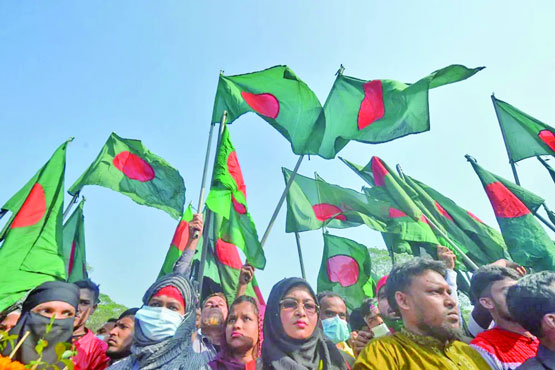More US sanctions may come on Bangladesh
Industry Report: More US sanctions on Bangladesh are coming. In addition to the human rights issue, new US sanctions are expected this month on some former and current officials and political figures involved in maintaining law and order due to various reasons, including the erosion of democracy, political oppression and corruption. However, the government is ready to face any kind of ban.
The distance between Sheikh Hasina’s government and the United States is not decreasing. The ban on RAB, the activities of US Ambassador Peter Haas assigned to Dhaka on election issues, the non-return of Bangabandhu’s self-confessed murderer and Nobel laureate Dr. Muhamad Yunus. It is quite visible that the Awami League government is unhappy with the United States for various reasons, including Muhammad Yunus issue. Nevertheless, trade and investment, regular partnership relations and diplomatic contacts between the two governments also continuing. Recently, the Prime Minister visited the United States. Even on election issues, the US is now speaking in a much more flexible tone. In the meantime, in the shadow of sanctions, questions have arisen in political and diplomatic circles – does the United States want to keep the current government under pressure? What is the interest of the US in this pressure?
On December 10, 2021, Sheikh Hasina’s government and the United States began an open confrontation with the US sanctions against the RAB and its officials. The United States was informed by the government that any complaint against the RAB officials would be taken into consideration and brought under trial. Apart from this, the elite force RAB’s contribution to the protection of security and law and order in the country is not unknown to the United States. However, the US has not lifted the sanctions against RAB and its officials in the last one and half year. In such a situation, rumors of ban are heard again. Those concerned think that knowing the information about this new ban, Prime Minister Sheikh Hasina has been criticizing the US in recent speeches and interviews.
US criticism of the head of government intensified this year. In his speech in the National Parliament on April 10, the Prime Minister said that the United States can overturn the power of any country. In the meantime, besides strengthening the party before the next election, he has ordered the leaders, activists and supporters to be careful against any kind of domestic and foreign conspiracy. In a recent interview with the BBC, in response to a question, the head of government commented that the United States does not want to see him in power.
Regarding the RAB, the prime minister told the BBC that the force established in 2004 on the advice of the US, with its own training and equipment, is working as it was created. So why did they ban this?
Bangladesh Enterprise Institute (BEI) president and former ambassador M Humayun Kabir considers the fear of further ban as unfortunate. He said that Bangladesh is now not only politically involved with the world, but also trade, investment, technology and even strategically. Therefore, if we act keeping in mind the global expectations, it will be possible to avoid challenges like sanctions.
The reason for the fear of sanctions again: Analysts think that the United States has taken the strategy of sanctions to keep the government under pressure. This pressure is certainly not to make the upcoming parliamentary elections of Bangladesh fair and free. Bangladesh politics and elections are not their focus. The US wants to create a powerful anti-China ring in the region. Where Bangladesh is an important power. And the government of Bangladesh is moving ahead independently and impartially with the foreign policy of Bangabandhu Sheikh Mujibur Rahman, the father of the nation, ‘friendship with all, enmity with none’. Sheikh Hasina’s government has highlighted independent and neutral thinking in the recently announced Indo-Pacific Outlook. Naturally, this thinking is different from the US Indo-Pacific strategy, which has worried the Biden administration.
In the last one and a half decades, Sheikh Hasina’s government has maintained a balanced diplomacy in addition to strengthening historical friendship with close neighbor India, strong economic ties with China, and trade and investment ties with the Western world including the United States. Bangladesh is moving forward despite the challenges of the global economy caused by the Corona epidemic and the Russia-Ukraine war. Apart from geographical location, geo-politics, geo-economics and strategic factors, the two superpowers of the world, China and the United States, are desperate to keep Bangladesh, which has become important at the international level as the emerging economic power of South Asia. Among these, Bangladesh imports the most from China and exports the most to the United States. The chemistry of the relationship with the two strongmen is also different. Yet the United States feels that China has monopolized the sphere of influence of the Bangladeshi government and policy-making circles.
Meanwhile, the United States wants to sign Defense Acquisition and Cross-Servicing Agreement (ACSA) and General Security of Military Information Agreement (GISOMIA) with Bangladesh. Under these two agreements, US forces want to exchange food, fuel, ammunition, military equipment and military intelligence. On the other hand, the United States is an important foreign partner in Bangladesh’s energy sector. US multinational energy corporation Chevron produces the majority of local gas. Texas-based natural gas distribution company Accelerate Energy through two floating storage and regasification facilities in Maheshkhali.
President Joe Biden tests positive for COVID-19 while campaigning in Las Vegas, has ‘mild symptoms’
International Desk: President Joe Biden tested positive for COVID-19 while traveling Wedne…








